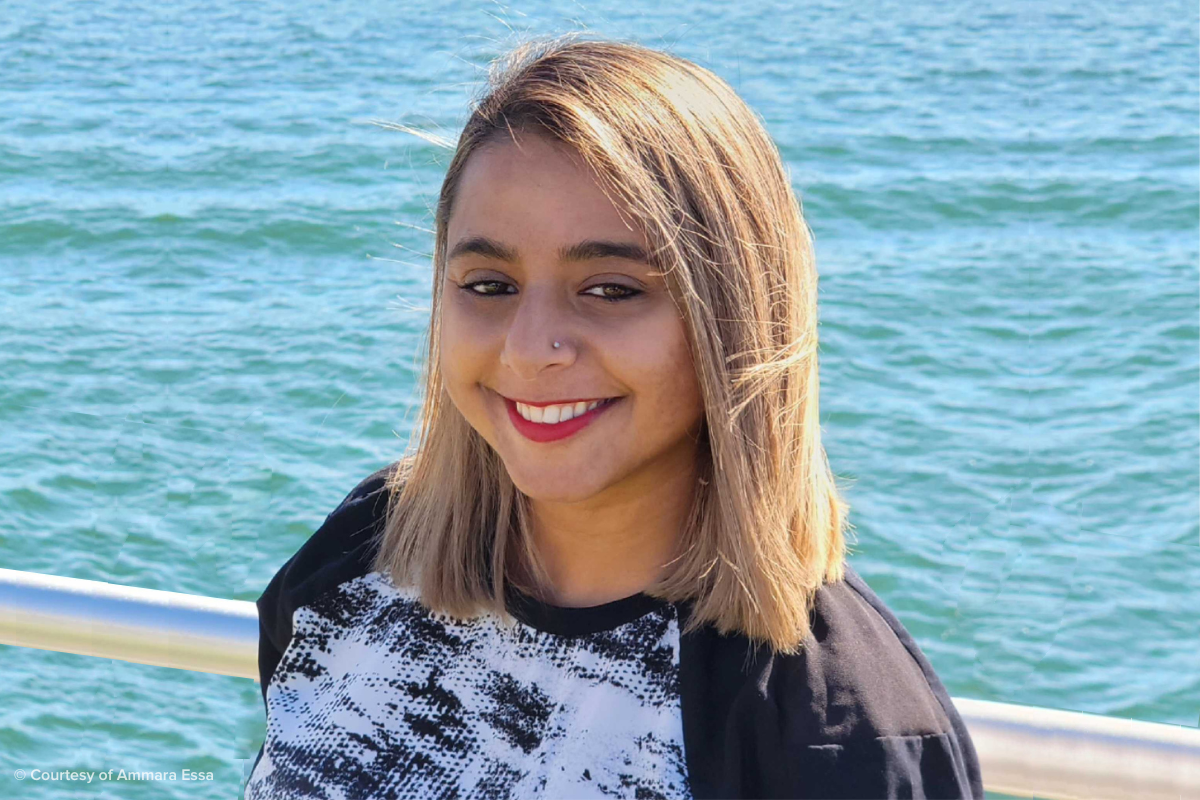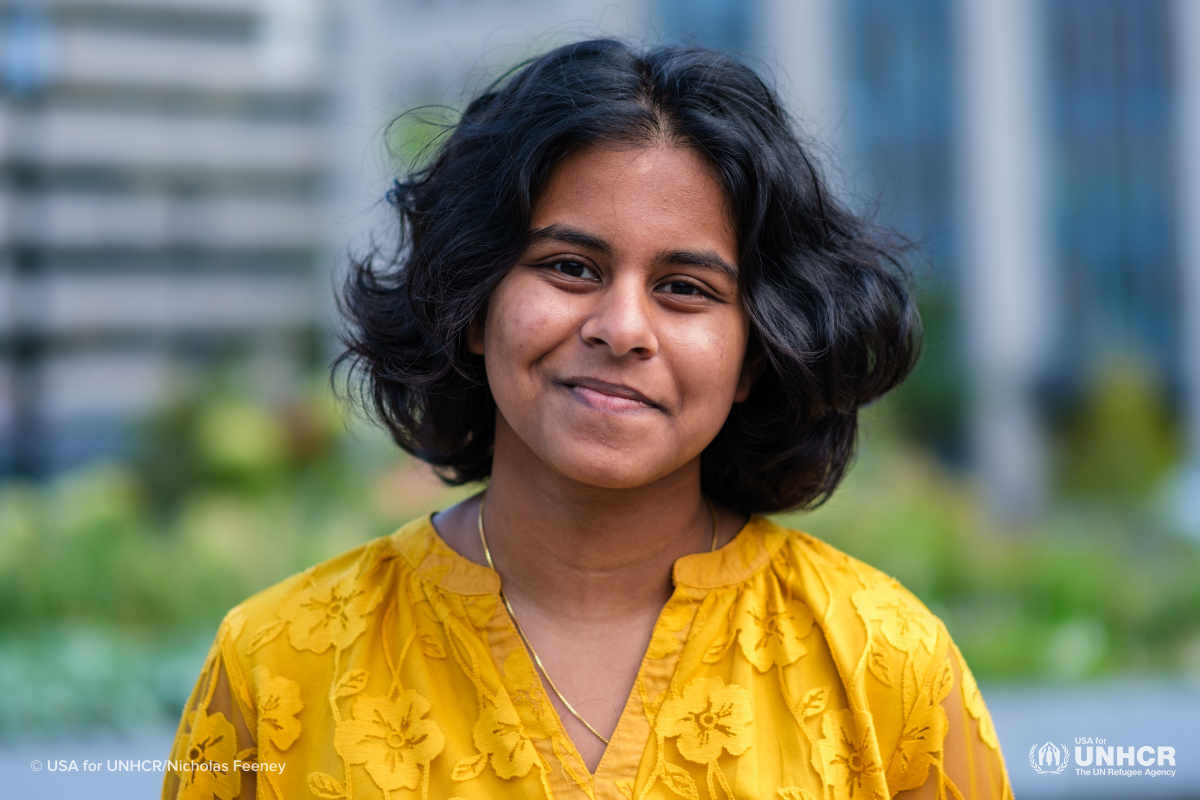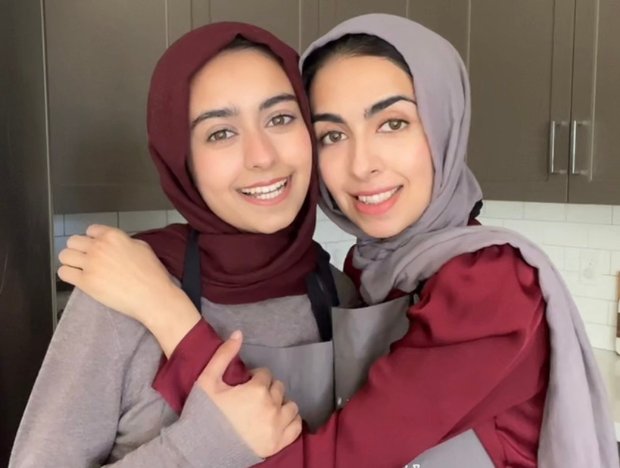Meet Ammara, a data scientist and volunteer with a passion for helping refugees

Ammara Essa is a data scientist at Verizon and a passionate USA for UNHCR volunteer. We recently spoke with Ammara about her inspiration and interest in helping refugees and her volunteer work with USA for UNHCR’s innovation team, The Hive.
USA for UNHCR is a Verizon Strategic Volunteer Partner for the Citizen Verizon Volunteers, where Verizon employees can donate their time and skills to support refugees. USA for UNHCR has been working with Citizen Verizon Volunteers since 2021 and has engaged more than 1,246 Verizon employees in 1,401 hours of volunteer work.
Tell me a little about yourself.
My name's Ammara Essa. I am based out of Los Angeles, California and I'm an engineer at Verizon. I've worked with Verizon for about 13 years. During that time, I've done a wide variety of roles, ranging from radio engineering and currently I'm in the data science team.
How did you hear about this volunteer opportunity with USA for UNHCR?
I've been a supporter of UNHCR for over a decade, as a donor. And had always been looking for more ways to help. And at the same time, I'd actively been using Verizon's volunteer portal to find initiatives that I connected with, especially in the realm of STEM and bridging digital divides.
So a few years ago, I came across an opportunity with USA for UNHCR in the Verizon portal, which was a brainstorming session on how to deploy temporary wireless networks for places such as refugee camps. And as a wireless engineer, I felt that I finally found that perfect intersection of something that I deeply cared about and something that I could actually use my skillset for.
Can you explain what the portal is?
It's the Verizon Citizen Volunteer Portal. It's an internal portal that we have where we list out different volunteer opportunities, under different scopes. Some of them are related to STEM, some of them are related to environmental stuff, some of them are for veterans — it has a wide variety of opportunities that you might want to be involved in. It's a place for us to find the opportunity and also do it under the banner of the Verizon volunteer goal.
Is that something you think Verizon feels strongly about, supporting employees as they do volunteer work?
Volunteering is something that's very deeply personal to a lot of people. I feel like the company's very encouraging. It's not just that they're supporting you in doing it, but they're actually encouraging you to do it. But really, more importantly, they're giving you the resources to go ahead and take that action.
The [volunteer opportunity with USA for UNHCR] made a lot of sense for me because it was very focused, it was very well defined. I really appreciated that aspect of having a clear scope of each session. And we got a lot of really good information from UNHCR, a lot of good background information, videos, that kind of thing.
I've been volunteering with you [USA for UNHCR] through Verizon for a couple years now, and I've loved every minute of it.
Can you go into a little more detail about exactly what you've done as a volunteer for USA for UNHCR?
Yeah. At this point I've been working with USA for UNHCR for several years now. I have an academic background in both electrical engineering and communication systems and in data science and machine learning. So that allowed me to be a part of a variety of different projects and initiatives. Ranging from planning sessions for deploying a functioning communications network. Another one was researching topics on digital inclusion for refugees with disabilities, so it was more of a research-based initiative. Some of them were analytics. At one point there was more of a forecasting question — how can we forecast bandwidth use at refugee camps? Is there a way to optimize the limited bandwidth that you have?
Most recently, I had the opportunity to work, along with some other volunteers from Verizon, to provide feedback on a donor retention dashboard. Because I have done a fair bit of analytics myself, I've created a lot of dashboards for different audiences, I was able to share some of our best practices in making an effective and meaningful dashboard that doesn't leave the user more confused as to what they need to do.
That's the thing that I really enjoyed being able to do, is take my experiences as an engineer and share some of those best practices or good practices with other folks to help improve their own initiatives.
What were you hoping the outcome of this volunteer project would be?
As with any volunteer project, whether it's a food bank or you're sorting clothes, you really just want to make sure that your time and effort translates into a meaningful action. And that's really my goal, is I just want to make sure that anything that I do here, it results, even in some small part, into something tangible that would ultimately help to accomplish their mission.
In this case, [USA for UNHCR’s] mission is helping refugees worldwide. It's a big problem.
What is your connection to refugees and what made you interested in this specific cause? You said when you saw it on the portal, it really jumped out to you. Why was that?
I think at the core of it, it's a lot of how you build up as a person. My knowledge and understanding of refugees built up over time. I grew up in Karachi, Pakistan, surrounded by people from all walks of life and from all economic situations. And I think my first exposure to displacement was the influx of internally displaced people that would come to Karachi after fleeing like a deadly flood in their land, forcing them out of their homes with little to nothing.
So I attribute a lot of my awareness to my upbringing. I'd always seen my dad actively help those in need and I was inspired to follow in his footsteps. My parents always made sure that we were very aware of our privilege and our responsibility to give back to the community.
And as I got older and I moved to the United States, I became more aware of the refugee crisis on a global scale. I tried to learn more, listen to refugees’ voices as they shared about their own lived experiences. I never want to assume anything, I want to learn from them. It's something that's very moving and that I've focused in on and am trying to educate myself on.
But I don't think that's the only reason. As a person, I think experiencing joy is a fundamental human right. But it's difficult to find joy when you're a refugee and you have nowhere to go and nowhere to call home. So part of my attachment and passion for this, to raise awareness and help refugees, comes from the hope that they can experience happiness and joy and hope again in their everyday lives. And one way to get to that state is by not having to be occupied with the stresses of food, shelter, safety and that kind of thing — the crucial elements and aid that UNHCR provides.
My goal is to help them find joy again by getting their lives back on track. But I know I can't do it by myself, so by partnering with an organization like USA for UNHCR, we can get them back to the state where all they have to worry about is, "Where am I going to buy my birthday cake from?"
Can you clarify what you were referring to earlier when you mentioned the “things that you focused in on and are trying to educate yourself on”?
I'm trying to be better about listening to refugees and listening to their experiences.
This is where the internet is a wonderful place if you try and use it in a wonderful way. There are photographers, there's an account called “Everyday Refugees,” and he just captures refugees living their day-to-day lives. And it gives you an insight into this is their lived reality. And it's not so much about feeling sorry for them, it's about, "Okay, how can I help improve their lived reality?"
I'm also reading books by refugees. There's one I read recently about a man who escaped Syria and is now in the UK and now he, himself, is an advocate for refugees. Something that jumps out is that a lot of these people, when they get the assistance they need, I would say categorically, they pay it forward. They give other people assistance.
It's just learning that these are all humans. They had jobs, they had careers, they had passions, they had goals and interests and hobbies, and all of a sudden their worlds turned upside down because of something that's not in their control. And you want to get them back to the state where they can just sit at a park and paint if that's what they want to do.
I couldn't have said that better myself, honestly. So what would your message be to other Americans about why they should support refugees?
I always have this thing in my head that the only thing separating me from becoming a refugee is luck. Anything can happen to me that is out of my control, that could put me in that situation. So I think we should always be cognizant that anything can happen to anyone at any time, and it's not their fault.
I think Americans should join in this cause because sometimes we do tend to have blinders on. It's possible that we see it as a problem, the refugee crisis, but we're not recognizing the fact that these are people. This is something that happened to them, it's not who they are.
My hope would be for us to collectively be more open in our hearts and our minds to understand it's not an easy situation to be in. No one wants to do this. No one wants to make treacherous journeys across land and sea and desert. It's not like a day hike that they do. These are tough, tough choices. These are tough decisions leaving everything behind, largely because of something that they can't even control. All they’re seeking is safety.
We have to humanize them. We have to remind ourselves that these are mothers, fathers, daughters, sisters, aunts, uncles, nieces, teachers, poets, pianists, musicians, engineers, doctors. These are people. These are people who had lives. And that just got taken away from them. And wouldn't it be great if we could do something to get them back to a state of stability?
How you can help…
You can find opportunities to take action in support of refugees by visiting USA for UNHCR’s How to Help page. On this page, you can discover advocacy opportunities, ideas for engaging with and sharing refugees’ stories and multiple ways to give. Get involved today to help make the world a better place for refugees!

